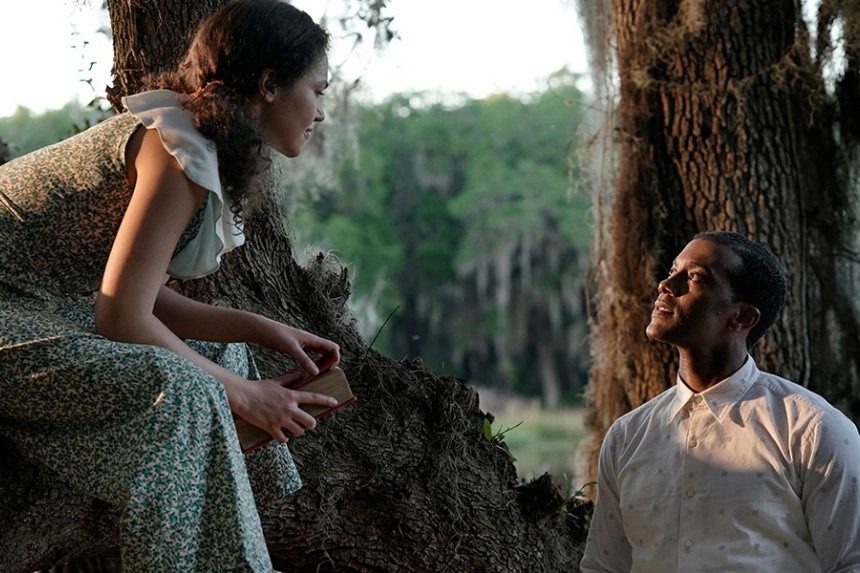A Jazzman’s Blues
⭐️ ⭐️ ⭐️
Run Time: 2 hours 7 minutes
Rating: R
Stars: Joshua Boone, Solea Pfeiffer, E. Roger Mitchell, Ryan Eggold
Writer/Director: Tyler Perry
Reviewed at the Toronto International Film Festival
If you’re any kind of writer, you’ll always have special affection for that one, early, unpublished labor of love. (May I introduce you to my novel, which has not emerged from my bottom drawer for air in 25 years?)
Tyler Perry had one of those. Through what seems like 2,000 Medea movies; through the creation of Atlanta’s busiest production studio and his emergence as one of America’s most consistently profitable movie makers, Perry always had that one script in his bottom drawer: A Jazzman’s Blues.
Ironically, Perry’s first movie script, written nearly 30 years ago, may be his best. As a filmmaker who has appealed primarily to Black audiences, he’s always spoken directly to the faithful through his bombastic screen id, Madea, or through the wordy musings of his often upwardly-mobile modern-day characters.
With A Jazzman’s Blues, Perry finds a more universal voice while still focusing on a distinctively African American theme: racism in post-World War II America. In his telling of the meteoric rise and awful end of a fictitious late-1940s Jazz singer called Bayou (Joshua Boone, a handsome actor with a lilting voice), Perry, with his usual in-your-face manner, offers a heartfelt account of racial hate and the ways — obvious and subtle — that it poisons both the aggrieved and the aggressor.
Raised in Georgia, Bayou is his mother’s pride and joy and his father’s perpetual annoyance. Dad is Buster (E. Roger Mitchell), an accomplished guitar player who not only favors Bayou’s older, trumpet-playing brother Willie Earl (Austin Scott), but also cruelly taunts Bayou. For some reason, his younger son’s ability to sing like an angel is just not good enough for him.
Eventually, Daddy and Willie Earl quit Georgia, heading for musical fame and fortune in Chicago. In their dust they leave Bayou and his devoted mom, Hattie Mae (Amirah Vann) to run the family’s rustic roadhouse, where every night the two of them rouse up the crowd with the most stirring Jazz this side of Beale Street.
Bayou doesn’t mind staying behind, because he’s smitten with the lovely, delicately featured Leanne (Solea Pfeiffer), a similarly poor girl who lives with her abusive grandfather. But events conspire to tear them apart until, years later, they find themselves living in the same Georgia town again — only now she’s married to the town’s new mayor…and she’s passing for white.
You get the idea — the plot executes more leaps and bounds than a Charlie Parker solo, and we know from the start that, before the final note, things are going to go horribly wrong. But even as his population of characters threatens to exceed that of Atlanta, Perry ushers the story along, stopping occasionally for some truly fine musical interludes featuring Boone, Vann, and flashy choreography by Debbie Allen.
After all this time, it does not appear that Perry will ever master the art of “show, don’t tell”—his characters still talk too much about what’s happening, and the man has clearly not met a verbal cliché he doesn’t like. There is one nice monologue about halfway through, delivered by, of all people, Ryan Eggold, star of TV’s New Amsterdam and The Blacklist, playing Bayou’s agent Ira — a thickly accented Jewish Holocaust survivor. Bayou has just fled town one step ahead of a lynch mob, and he’s consumed with terror and fury. Standing with him in a field, Ira places a patient hand on Bayou’s shoulder and conveys his own history enduring blind hatred and government-sanctioned bloodlust. It’s a powerful moment; a reminder not only of the shared experience of American Blacks and European Jews, but also a warning of what sorts of things can happen in a nation that has lost its collective mind.
Above all, there’s no denying the power of Perry’s commitment to the endeavor. His passion for A Jazzman’s Blues is palpable, and it shows in the performances and the care with which his set pieces unfold. Georgia’s Spanish moss has never looked more delicately beautiful than in Perry’s stage-like settings — even as the events occurring below make those wispy filaments seem less like a curtain and more like a shroud.
Become a Saturday Evening Post member and enjoy unlimited access. Subscribe now




Comments
This looks like a film worthy of my time. Thanks for the in-depth review.